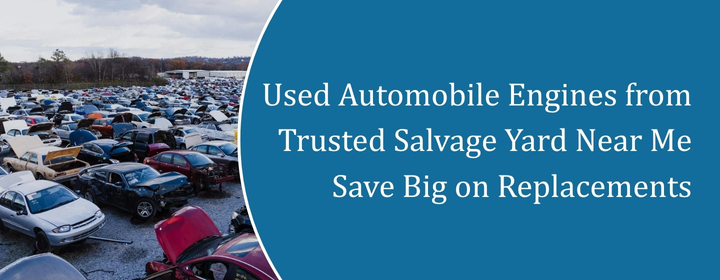
Used Automobile Engines from Trusted Salvage Yard Near Me | Save Big on Replacements
Buying used car engine isn’t that difficult and you should not rush into the deal when buying used engines for sale. You have to patient and smart to get a reliable used engines and transmissions. When the engine of your vehicle fails, you are left with only two choices; whether to replace or repair. Repairing isn’t worth it, if the engine is completely dead and it will cost you fortune as well. That is when people start looking for used engines which makes complete sense. But the real trick is to know what is worth your money and what not.
Why Go for a Used Engine
New engines cost a ton. In some cases, more than the value of the car itself. That’s the first reason most people go used. Salvage yards, auto recyclers, and rebuilders have plenty of engines from low-mileage wrecks. Cars that got totaled in an accident, but the engine survived perfectly fine. Those are gold mines.
Used engines also save time. Instead of waiting weeks for a rebuild, a decent used one can get swapped in within a few days. It’s faster, cheaper, and often just as good. Some even come with warranties from reliable sellers, which is a nice bonus.
Where to Start Looking
The hunt usually starts online, place like salvage yards, used parts networks and forums, and used engine specialized sellers who list inventory with actual photos and details. Websites like carenginepart.com, usedenginepart.com, beelinesautomotive.com, and many more. But local is always better if possible. Being able to actually see the engine before buying, that is a huge advantage.
Walk into a reputable salvage yard, and you’ll notice a difference. Organized yards keep engines tagged, tested, and stored properly. The shady ones leave them sitting in the dirt, half-covered in oil. Engines need to be store in dry places.
Match the Engine Properly
People assume that engine from make and model will fit into every year of model which is completely false. Every engine has different specs even with same generation. So, when buy used engines and transmission; you should verify compatibility using engine code, transmission code, and VIN.
VIN is of 15 numbers and its 8th digit tells the engine type. If it is not matching with the one you finalized than don’t go for that vary engine. Because there is high chance that the electronics also won’t match. You should also check compatibility of sensors and wiring, as well.
Some engines swap right in. Others require half a day of rewiring. A quick call to a parts department or checking online forums can save a lot of headaches here.
Check Mileage and Condition
Mileage is important but it is not the only reason when buying used engines for sale. Poorly maintained 60K mile engine is not worth than the 100K mile well-maintained engine. You need to find those engines which are pulled from cars and comes with service records. Fresh oil, clean plugs, and no sludge under the oil cap, all good signs.
Many reputable suppliers run compression or leak-down tests before listing engines. Those numbers tell if the cylinders still hold pressure properly. Also, check the engine for cracks, leaks, and rust.
Ask About Warranty and Return Policy
Even used engines for sale should come with at least a limited warranty. Most good sellers offer 30 to 90 days. Some go up to six months if they’re confident in the product. Always read the fine print. Some warranties only cover parts, not labor. Others require professional installation, meaning if a backyard mechanic installs it, the warranty is void.
Return policy is also important. If you receive the engine with the damage in shipping or it doesn’t fit as you expect. Return policy can save you by returning or exchanging the part and make your purchase safe.
Consider the Source Vehicle
When buying from a yard, ask what happened to the donor car. Front-end collision? Probably fine. Rear-end collision? Still okay. Flood-damaged? Hard no. Water inside an engine is a disaster waiting to happen. Rusted internals, shorted sensors, all kinds of problems that don’t show right away.
If the yard can tell the vehicle’s story, that’s a good sign. Transparency usually means they take care of their inventory.
Don’t Ignore the Extras
Sometimes engines come as long blocks, which means it is just the core engine: block, heads, and internal components. Others are complete assemblies with manifolds, injectors, alternator, and sensors included. Complete assemblies can save time and money if the extras are in good condition.
But sometimes it’s better to reuse the original accessories. Especially if the replacement engine comes from a slightly different model year. That way, everything bolts up perfectly without electrical surprises.
Installation and Testing
Before installing, it is smart to replace wear parts. Cheap insurance before the engine goes in. Once the engine is installed, you need to change fluid and check leaks.
At first keep the engine at idle then bring it up to temperature. Try to listen for sounds and make sure there is no strange noises. If everything is running smooth don’t drive roughly for first few hundred miles.
Common Mistakes to Avoid
- Buying without checking the engine code.
- Ignoring warranty details.
- Skipping compression tests.
- Trusting unverified sellers.
- Forgetting to check for flood or rust damage.
Avoiding these above mistakes can save you from spending money on waste.
Conclusion
From the above gist, we conclude that used engines for sale is the best alternative to bring your vehicle back on the road. Here the key is to research, inspect, and buy from reputable source like carenginepart.com. The best deals aren’t always cheap one. It is one which last for years. Take some time to check compatibility, perform a test, and verify vehicle history. Your few extra hours can save you from future headaches.

